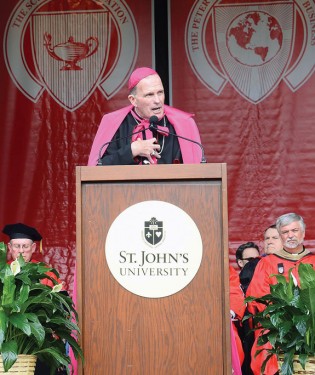
By Father William J. Byron, S.J.
“I NEVER SAW a hearse towing a U-Haul,” remarked a friend of mine the other day.
He was talking about the problem of materialism in contemporary life and the need to find ways of convincing young people that there is a whole lot more to life than making money and piling up possessions.
That comment about the hearse without a trailer is a good way to open up the conversation with your son or daughter about what is really important in life.
This is graduation season, and it is interesting to notice how commencement speeches sometimes presume that so-called good life is more a matter of having than being, of taking than giving, of achieving rather than relating.
It is important, of course, to do something with your post-graduation life, but it is a mistake to think that success is spelled with dollar $ign$ and that happiness depends on having material wealth, rather than on sharing one’s self with others.
The Really Good Life
It will be a revelation to many young people if you tell them that the good life – the really good life – is the life lived generously in the service of others.
You won’t tell them this if you don’t believe it yourself, and you surely won’t convince them that it is true if your own value system contradicts it.
If you have the opportunity to listen to, or read a graduation talk this year, try to identify the dominant value that is being communicated. Often, the guest speaker is invited to speak because he or she has some degree of fame and has made a mark in the world. If that fame is based on service, it is likely that the message will be an invitation to serve.
If the mark made points to power and wealth, the message may well amount to a false signal leading eventually to self-enclosed unhappiness in the long term.
Listen to the commencement address that your own son or daughter might hear this year and then dissect it – in the presence of your offspring – for the principles it presumes, and the values it communicates. My friend would begin that conversation by saying, “I never saw a hearse hauling a U-Haul, did you?”
And depending on the answer received, he will find himself leading a conversation with promising or poor prospects of arriving at the conclusion that the good life is the life lived generously in the service of others. That’s where he hopes this kind of conversation will lead.
He knows he will be missing a good opportunity if he fails to open it up. He also knows that if the right values are not in place, the next round of decisions about career or continuing education is one that is likely to require preliminary repair work to compensate for the failures of the education thus far received.
Jesuit Father William J. Byron is a university professor of business and society at St. Joseph’s University, Philadelphia.
